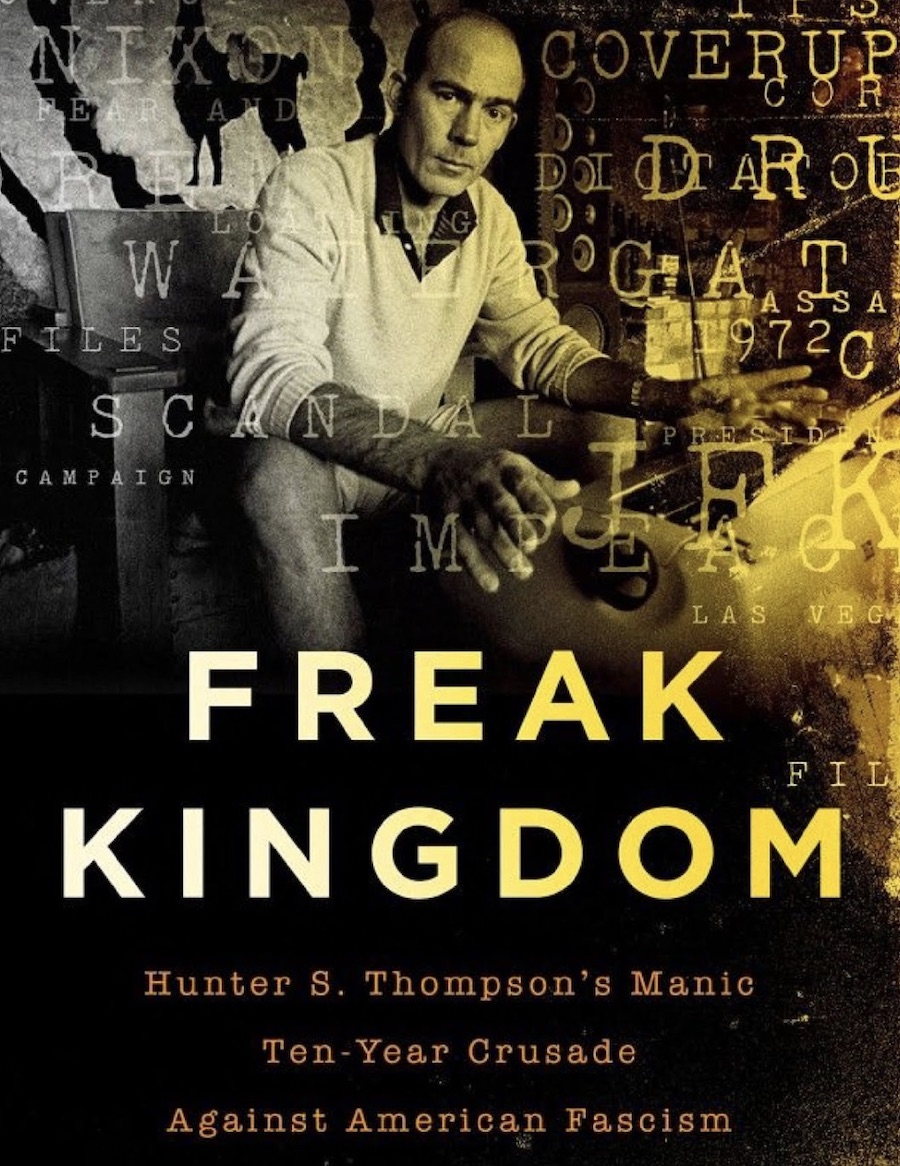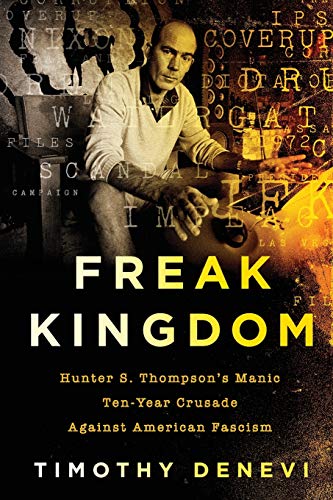The Political Education of Hunter S. Thompson
Despite an embargo on his archive, a new biography examines how events between the Kennedy assassination and Nixon's resignation pushed the writer toward his most trenchant work. Hachette Book Group
Hachette Book Group
“Freak Kingdom: Hunter S. Thompson’s Manic Ten-Year Crusade Against American Fascism”
A book by Timothy Denevi
Four decades have passed since Hunter S. Thompson became a cultural icon. His books continue to sell well, and a steady stream of articles, films and other materials have sustained his celebrity. Perhaps no one has done more than Jann Wenner, his publisher at Rolling Stone, to feature Thompson and repackage his work. But aside from Juan Thompson’s memoir, which details his rocky relationship with his father, few first-rate books have appeared since William McKeen’s biography, “Outlaw Journalist,” was published in 2008.
That same year, actor Johnny Depp purchased Thompson’s archive. About 800 boxes of material were placed in storage, where they remain to this day. We don’t know when scholars will have access to those materials, but we have some idea of their riches. Thompson’s literary executor, historian Douglas Brinkley, tapped them to produce two volumes of correspondence well before Thompson’s suicide in 2005. (A planned third volume never materialized.) According to Brinkley, those works include a fraction of the 20,000 letters Thompson wrote before 1997. The archive is likely a low priority for Depp, whose finances are in disarray. For Thompson’s critical fortunes, however, the current situation is an absurd defeat. Fanboys will continue to feast on his legend, but new research efforts must face the problem of the sequestered archive.
Into this breach has stepped Timothy Denevi, an assistant professor in the MFA program at George Mason University. His new book, “Freak Kingdom: Hunter S. Thompson’s Manic Ten-Year Crusade Against American Fascism,” draws heavily on the extant sources and occasionally supplements them. His interview with Bay Area physician Bob Geiger, for example, illuminates Thompson’s long-standing use of Dexedrine. Thompson sampled many drugs, but Denevi maintains that Dexedrine and alcohol were his staples, at least until his cocaine habit marked the end of his most productive period. Even on the road trip that inspired “Fear and Loathing in Las Vegas,” which details the drug cornucopia stashed in the narrator’s trunk, Thompson’s actual supply consisted only of marijuana and Dexedrine—as well as Benzedrine for his traveling companion, attorney and Chicano activist Oscar Zeta Acosta. Although Denevi emphasizes Acosta’s influence on Thompson’s political outlook, Thompson dedicated his book to Geiger “for reasons which need not be explained here.”
“Freak Kingdom” focuses on Thompson’s political journalism in the years between the Kennedy assassination and Nixon resignation. It’s an astute way to frame his peak period. Although Thompson continued to harbor hopes for his fiction, the Kennedy assassination pushed him toward journalism and prompted his signature phrase; in a letter written that day, he mentions “the fear and loathing that is on me after today’s murder.” The events he witnessed during this interval—especially the 1964 Republican and 1968 Democratic national conventions—informed his other key book, “Fear and Loathing: On the Campaign Trail ’72.” Along the way, Denevi also considers Thompson’s work on the death of Los Angeles journalist Ruben Salazar; the Freak Party campaigns in Colorado; the origins of “The Kentucky Derby Is Decadent and Depraved,” the first example of gonzo journalism; and the rise and fall of Richard Nixon, who inspired some of Thompson’s most trenchant work.
Readers will be disappointed if they expect a searching evaluation of Thompson’s political journalism. Instead, the chief concern is his political education, which Denevi re-creates by featuring episodes from Thompson’s personal and professional life. He makes that purpose clear at the outset:
In these pages I’ve tried to dramatize his political evolution in the manner a novel might—while also citing every detail and quote along the way—with the hope of expressing, for you, the effort he put out as a writer and thinker to combat institutional injustice.
Shrewdly combining details from various sources, Denevi offers a series of fully realized scenes whose vitality exceeds any single collection of facts.
How reliable are these scenes? Denevi complicates that question by comparing his use of sources to a translator’s. “Some meanings come across perfectly,” he writes in his bibliographical note. “Others demand the intercession of the translator to expand upon and render a more explicitly subjective judgment. Facts are never singular, even if Truth may very well be.” This passage is unlikely to satisfy hard-shell empiricists, who stubbornly prefer to know where the facts end and the subjective judgments begin. Moreover, Denevi’s reference to Truth, with its telltale initial capitalization, signals a turn toward metaphysics. Even for sympathetic readers, the note may raise more questions than it answers.
The question of reliability is more than an exercise in academic fussiness. In fact, it goes to one of Thompson’s central concerns: the best way to render the world truthfully. He never accepted the distinction between veracious journalism and fanciful fiction. To the contrary, he always thought fiction was a superior vehicle for expressing truths that mattered. “Fiction is a bridge to the truth that journalism can’t reach,” Thompson claimed in a 1965 letter to editor Angus Cameron. “Facts are lies when they’re added up.” He also described gonzo journalism as “a style of ‘reporting’ based on William Faulkner’s idea that the best fiction is far more true than any kind of journalism—and the best journalists have always known this.” A McGovern strategist endorsed this point when he described Thompson’s coverage of the 1972 presidential race as the least factual and most accurate account of the campaign.
Thompson defended his novelistic outlook and occasionally went on the offensive. In his obituary for Richard Nixon, for example, he claimed that mainstream journalism’s slavish devotion to objectivity empowered his long-standing adversary.
Some people will say that words like scum and rotten are wrong for Objective Journalism—which is true, but they miss the point. It was the built-in blind spots of the Objective rules and dogma that allowed Nixon to slither into the White House in the first place. … You had to get Subjective to see Nixon clearly, and the shock of recognition was often painful.
Though not an explicitly political work, “Fear and Loathing in Las Vegas” also drew its power from that warped subjectivity. By channeling his experience though a fictional first-person narrator, Thompson told Tom Wolfe, he hoped to prevent the “grey little cocksuckers who run things” from “drawing that line between Journalism and Fiction.” Even Thompson’s editor at Random House had to ask whether “Fear and Loathing in Las Vegas” was fiction or nonfiction.
“Freak Kingdom” not only endorses Thompson’s method but also adopts it. Certainly the use of novelistic techniques chimes well with the New Journalism that shaped him. If fiction is a bridge to the truth, this project declares, let the construction begin. Although Denevi does not say so, “Freak Kingdom” also responds creatively to the effective embargo on the archival material. It doesn’t replace more traditional forms of literary study, nor does it offer a compelling political analysis; although the subtitle mentions American fascism, for example, that topic receives no serious treatment. Nevertheless, the book meets the standard Denevi set for it. By dramatizing the key decade in Thompson’s life, “Freak Kingdom” brings his weird journey into clear and vivid focus.
Your support matters…Independent journalism is under threat and overshadowed by heavily funded mainstream media.
You can help level the playing field. Become a member.
Your tax-deductible contribution keeps us digging beneath the headlines to give you thought-provoking, investigative reporting and analysis that unearths what's really happening- without compromise.
Give today to support our courageous, independent journalists.







You need to be a supporter to comment.
There are currently no responses to this article.
Be the first to respond.